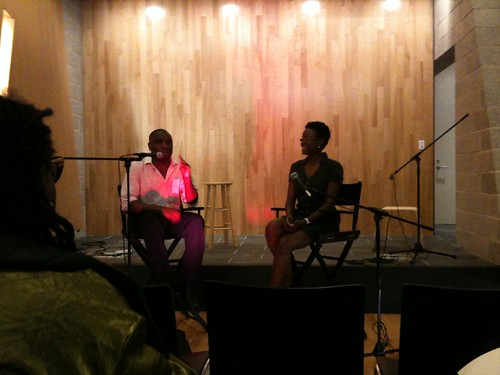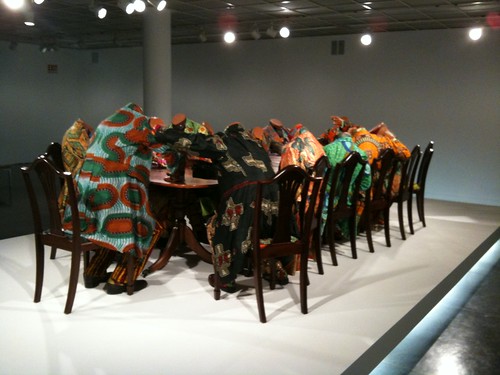So much has transpired since my last post, on LGBTQ Pride Weekend (and the horrendous raid that Sunday in Fort Worth), but I guess what's loomed largest is the mass mourning, approaching a kind of mass hysteria, surrounding Michael Jackson's death. As I posted, I was very saddened to learn of his passing, and eagerly acknowledge his talent and greatness--as well as his flaws--but as I've also suggested to C and others, I think people are using his death as a vessel into which to transfer and transmute a wide range of emotions for which they have no or only inadequate other outlets, particularly as we move nationally and globally through a period of instability and financial and social crisis. The news media's obsessive focus on and creation of the spectacle of Jackson's death, the particulars of his children's patrimony, the raft of scandals that attended him, and so on, have contributed to this. I heard a Harlem resident say last night on the TV that she found herself crying over MJ's death whenever she was alone in her apartment, so she was taking comfort in hanging out at the Apollo Theater on 125th Street and other spaces filled by Jackson fans, such as the plaza at the Adam Clayton Powell Building just down the street. My initial question was what was going on in her life that she was bursting into tears when alone at home (I know people who're on the verge of weeping at losing their jobs or not getting hired at ones they applied for, paying their rents and medical bills, and so on), but the TV reporter didn't go near such a question, instead subsequently interviewing several other people who expressed similar sentiments. This is what I've seen them do again and again over the last few days; and the media, which knows a cash cow when it sees it, is going to milk this tragedy as much as it can. Do we really need to see the tearful tribute of Jackson's only daughter, Paris, over and over? What does genuine interest shade into the macabre? Perhaps it is good that this is where this affective energy is being directed, rather than towards more obvious and less positive ends. For a split second I thought that it might end after the tribute yesterday, which I didn't watch, but I realized this morning how wrong I was. There's too much "story" that remains to be created, told and transformed into a commodifiable spectacle, not least about the circumstances of Jackson's death itself, and then there're the will, the children, Neverland, the music catalogue, the ex-wife...I already feel myself get transported right back into the maw!
***
 Today Al Franken (at right, minnesotapublicradio.org) was seated as Minnesota's junior senator and becomes the 60th member of the Senate Democratic caucus, which includes 2 independents and one recent party-changer. Given the large number of conservadems (1 of the 2 independents; the recent party flipper; a handful of "moderates"/"centrists" and corporatocrats who take their bidding not from the party leadership, what little exists, or their constituents, but from big business and lobbyists), I think it's fanciful to think that the Democrats will be pushing through anything approaching truly liberal, let alone progressive, legislation of any substance. Most of the legislative achievements since President Obama took office have been symbolic or heavily watered down. Most notable might be the Lilly Ledbetter Fair Pay Act, most notorious the Stimulus package, about which we're now hearing whispers that we'll need another. Of course we will! In fact, on Sunday's This Week with George Stephanopoulos, Vice President Joe Biden blurted out the administration's recognition of its conceptual and practical blunder, suggesting that it misread the economic situation, though many major economists (Paul Krugman, George Stiglitz, Nouriel Roubini, Brad DeLong, etc.) had entreated for a far larger stimulus until their faces turned blue. Getting that second (and very likely a third or even fourth, etc.) massive spending package will take a herculean effort, however, and even with Franken on board, I think it's going to be extremely difficult, especially if Obama keeps sending out mixed signals and listening to much to his chief financial advisors, who continue to share more than a rib with Wall Street (Goldman Sachs). Republicans have demagogued about the stimulus since before it passed, and now that they've got the budget hawks circling--why is Pete Peterson on TV at least once every week?--their skewed perspective could start to take root, as it has many times in the past. The mainstream media haven't given any real sense of how the original stimulus bill was supposed to, let alone whether or not it is working, and why, from a basic economic standpoint, it's necessary. Instead, as I saw tonight on The News Hour with Jim Lehrer, there was the usual tit-for-tat, involving a Republican spouting nonsense (but adjudged as reasonable) and a Democrat fumbling to make his case (thus equaling their positions out). There was also a "non-partisan" economist who was careful not to tip his hand either way.
Today Al Franken (at right, minnesotapublicradio.org) was seated as Minnesota's junior senator and becomes the 60th member of the Senate Democratic caucus, which includes 2 independents and one recent party-changer. Given the large number of conservadems (1 of the 2 independents; the recent party flipper; a handful of "moderates"/"centrists" and corporatocrats who take their bidding not from the party leadership, what little exists, or their constituents, but from big business and lobbyists), I think it's fanciful to think that the Democrats will be pushing through anything approaching truly liberal, let alone progressive, legislation of any substance. Most of the legislative achievements since President Obama took office have been symbolic or heavily watered down. Most notable might be the Lilly Ledbetter Fair Pay Act, most notorious the Stimulus package, about which we're now hearing whispers that we'll need another. Of course we will! In fact, on Sunday's This Week with George Stephanopoulos, Vice President Joe Biden blurted out the administration's recognition of its conceptual and practical blunder, suggesting that it misread the economic situation, though many major economists (Paul Krugman, George Stiglitz, Nouriel Roubini, Brad DeLong, etc.) had entreated for a far larger stimulus until their faces turned blue. Getting that second (and very likely a third or even fourth, etc.) massive spending package will take a herculean effort, however, and even with Franken on board, I think it's going to be extremely difficult, especially if Obama keeps sending out mixed signals and listening to much to his chief financial advisors, who continue to share more than a rib with Wall Street (Goldman Sachs). Republicans have demagogued about the stimulus since before it passed, and now that they've got the budget hawks circling--why is Pete Peterson on TV at least once every week?--their skewed perspective could start to take root, as it has many times in the past. The mainstream media haven't given any real sense of how the original stimulus bill was supposed to, let alone whether or not it is working, and why, from a basic economic standpoint, it's necessary. Instead, as I saw tonight on The News Hour with Jim Lehrer, there was the usual tit-for-tat, involving a Republican spouting nonsense (but adjudged as reasonable) and a Democrat fumbling to make his case (thus equaling their positions out). There was also a "non-partisan" economist who was careful not to tip his hand either way.The president ought to be taking pointers from Bill Clinton (for a change) and traipsing all over the US, publicizing the bill's effects and showcasing how things could be much worse. Instead, he's utterly, totally, completely focused on the health care bill, which keeps threatening to turn into a debacle as the insurance industry, conservadems, the GOP...well, you know where that's going. All in all, it makes me think that beyond marking a moment of real political relief for Minnesotans, Franken's seating will be, at least for the near term, mainly a symbolic triumph, like so much of what's transpired since this past January 20.
***
Below are some photos from a Kalup Linzy conversation and performance, part of his Kalup Linzy: If It Don't Fit show that C and I caught at the Studio Museum in Harlem the evening we learned of Michael Jackson's death, and from the Yinka Shonibare MBE show I attended, with Tisa, at the Brooklyn Museum. For both of these artists, these shows mark their first New York retrospectives.
I'd never seen Linzy live, though I've caught many of his performances, such as All My Churen (2003) and Da Young and Da Mess (2005) on YouTube, but I don't think I'd be stretching to say that he is one of the most highly touted younger American or African American artists today. Friends have been singing his praises, and some bloggers, like Frank Leon Roberts (who I saw briefly after the event) have posted about Linzy's art. Calling the work a highly stylized and original cross between soap operas, dramatic music videos, "chitlin circuit" dramaturgy, comedy skits, and a young artist's highly personal and savvy take on contemporary pop and art culture, performance, and spectacle only begins to credit Linzy's work adequately. Just when I think I have a handle on what he's up to, I see pieces like the ones on display at the talk, music videos/short films for "Sampled and LeftOva" and "F**k U," which presented unexplained but quickly involving dramas in which Linzy, as "Taiwan," first played witness to a confrontation between exes, one of whom was actress Chloe Sevigny, and second ended up telling off and then being told off by Sevigny. The centrality of the "drama"--or perhaps I should say, "the drama," is one of the things I like about Linzy's work, along with the fact that he writes, directs, and performs in all of them, which unfold like a series of related but often independent riffs. The conversation originally was supposed to include both SMH director Thelma Golden and writer Hilton Als, who potential presence alone made me want to attend it, but, alas, neither was able to make it. Instead, a young woman whose last name I didn't get (her first name was Aisha/Ayesha) asked Linzy, who seemed a little nervous and uncomfortable, questions about his background and practice, and then turned the floor over to the audience, several of whom also engaged him.
Ultimately, though, the Q&A, which refreshingly preceded his performance, was too brief; while he noted his knowledge of Golden's landmark and controversial 1995 Whitney Museum exhibit, The Black Male Show, momentarily discussed his use of the pre-recorded voices to transform our sense of what was going on, and talked about his watching soap operas, I really wanted to hear more about the origins of these pieces, how the evolving televisual media facilitated what he was doing, and what he felt about how his work was playing with issues of gender, sexuality, race, class, performance, and so on, all of which his work plumbs provocatively. Instead, after a short break, Linzy returned and, as the image below shows, performed a series of songs in the persona of "Taiwan," with accompaniment. The songs--among them "A*******" and "were inventive, funny, very black-and-queer (one includes a line about God "throwing shade"), and made me want to purchase his 2008 CD, SweetBerry Sonnet, on which many of them appear. (It, and his new joint, Sampled and LeftOva, are available on iTunes.)
What I told Tisa when we hung out a week later was that what struck me about Linzy's performance--as opposed to the videos--was that 20 years ago, it might be taking place in a small gay club, art space, or, I could even imagine, the Apollo Theater just down the street, rather than an art museum. On the one hand, this is certainly an achievement worth noting, and Linzy appears to be quite aware and comfortable with his relationship with the art world, which rightly adores him. On the other hand, I wondered to Tisa, is anything lost when what was once so outside the art world and (potentially) oppositional is incorporated into it, or is this really just a dead letter at this stage in the...game? The SMH show ended on June 26, so look around because I think it is traveling.

Kalup Linzy in conversation with a member of the Studio Museum staff

Kalup Linzy performing as "Taiwan"
About a week later I hit the Yinka Shonibare show at the Brooklyn Museum, one of my favorite museums in New York (or anywhere else). It's a hidden gem that I always curse myself for not taking great advantage of. Shonibare (1962-) is a contemporary British artist born to Nigerian parents in London, though he returned to Nigeria at 3, spent considerable time in Britain growing up, spoke both Yoruba and English, and then received his art education in London. His work primarily mines the tensions produced at the nexus of this background, though extrapolated far outwards from his own personal story. Certainly aesthetics, history, race, class, sexuality, and colonialism and post-colonialism are front and center in his art. That might sound like a well-trod mix, but Shonibare has some surprises up his sleeve, as I learned at the exhibit. I primarily knew him from his headless mannikins sporting Victorian costumes in brilliantly-colored Dutch wax fabric (itself ironic, as it immediately strikes the eye as "African," yet the most expensive versions are produced, as Shonibare has noted, "in Holland" and exported back to Africa (and were initially inspired by Javanese batik prints), thus encapsulating the colonial/post-colonial dynamic in vivid historical and material form), some of which have become iconic, but he also is a painter, photographer, sculptor, video filmmaker, actor, and installation artist, whose images and artefacts share with Linzy's some debt to and a sense of play with tableaux vivants. The two videos on the first floor To me the most striking aspect of this show was the site-specific installations (we missed several of them, I think) in the period rooms, which the Brooklyn Museum has a sizable number of, and which are worth seeing just on their own.
This portion of the exhibit, entitled Mother and Father Worked Hard So I Can Play, features headless child-sized, Dutch wax-fabric clad mannikins, as shown below. The headless figures are a bit eerie, especially in miniature form, but what I also found myself doing, as Tisa did, was both trying to find them in room after room--turning the exhibit into a bit of a scavenger hunt, which was exciting and made me realize after a certain point that I was engaging in a form of "play," even going so far as to peer up at ceilings and into corners in order not to miss one--and also concentrating carefully on the periods depicted and how the presence of these "children" cast every aspect of these allegedly neutral staged historical displays into relief. Fred Wilson's brilliant critical installation work came immediately to mind; I began wondering what about the specific rooms, the time periods (several were anterior to the Victorian period) and regions (such as a 18th century South Carolinian room), had drawn Shonibare's eye, and what the figures' forms of play meant in light of the "meanings" the rooms started to assume. Though it was less clear that Wilson's work, my experience of these pieces was really quite invigorating. I was initially bummed that more of Shonibare's work, such as the "Diary of a Victorian Dandy" series, which I saw in the paper and which appear in the catalogue, did not seem to be part of this show, but Tisa told me today that in fact we'd missed a a section of the 4th floor galleries, meaning I'll have to go back and see it again. I'll have time, and so will you: the Shonibare show runs from June 26, 2009 through September 20, 2009.

One of Shonibare's installation pieces, from Mother and Father Worked Hard So I Can Play, in a Brooklyn Museum period room

One of Shonibare's installation pieces, from Mother and Father Worked Hard So I Can Play, in a Brooklyn Museum period room

"A Scramble for Africa" (2003)
No comments:
Post a Comment